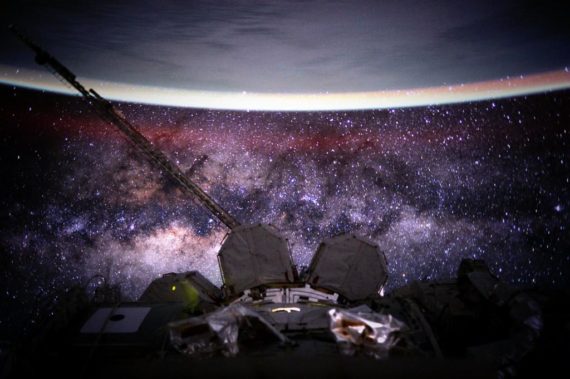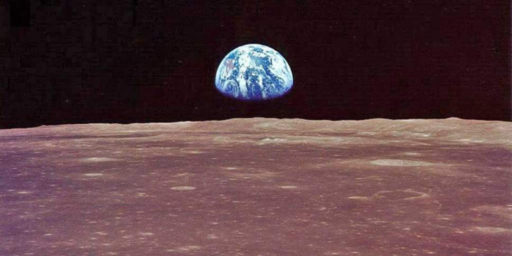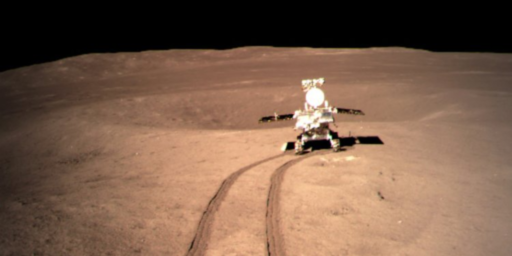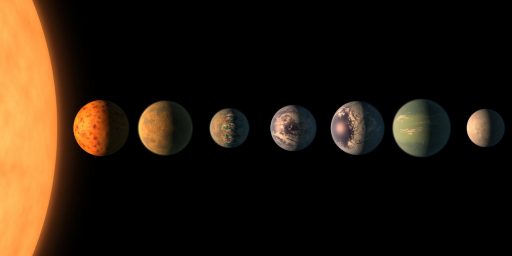No, The Octopus Didn’t Come From Outer Space
Thanks to mostly what amounts to bad science reporting in the popular media, a false claim about one of nature's most mysterious and unique creatures continues to spread.

There’s been an Internet meme floating around for a couple years now that has reared its head again over the past several days, namely the suggestion that Octopuses could be an alien form of life brought to Earth in the form of eggs that hitched a ride on a meteor or comet that crashed into Earth hundreds of millions of years ago:
Octopuses are aliens. That’s the claim being made by a team of 33 researchers published in a peer-reviewed scientific journal.
They are not referring to aliens in a metaphorical sense, but literal aliens from outer space.
Since the paper was released on Sunday, a trickle of news coverage has turned into a torrent, with increasingly alarming headlines about octopuses and their extra-terrestrial origins.
It will not come as a surprise to many to learn that these claims have been roundly mocked by the scientific community, who have branded the paper - published in Progress in Biophysics and Molecular Biology - as ridiculous and unscientific.
They suggest the Cambrian explosion, a sudden burst of life that occurred around 540 million years ago, was the result of extra-terrestrial intervention.
The paper asks whether this event, which saw the rapid emergence of most of the main animal groups that still exist on Earth today, was “terrestrial or cosmic”. Their conclusion is the latter.
Specifically, the researchers propose the idea that alien viruses crashed to Earth in a meteor, infected a population of primitive squid and caused them to evolve into octopuses.
Another theory they suggest is that fertilised squid or octopus eggs were delivered to Earth by a meteor.
The idea is essentially a reimagining of the “panspermia” hypothesis, which suggests that life on Earth was “seeded” by space dust or asteroids crashing into Earth. One of its first proponents, Chandra Wickramasinghe, is one of the authors of the new paper.
Octopuses are weird. They are molluscs, meaning they are closely related to snails, and yet they are incredibly intelligent.
On top of their large brains and sophisticated nervous systems, the authors of the new paper list camera-like eyes, flexible bodies and ability to camouflage themselves by changing colour and shape as evidence of their extra-terrestrial origins.
So suddenly did these features appear in the octopus family tree that “it is plausible then to suggest they seem to be borrowed from a far distant ‘future’ in terms of terrestrial evolution, or more realistically from the cosmos at large,” the authors write.
“Such an extraterrestrial origin as an explanation of emergence of course runs counter to the prevailing dominant paradigm,” they continue. This is a strong contender for understatement of the century.
There are, obviously, plenty of reasons to doubt this hypothesis:
There are plenty of reasons. First off, as Mark Carnall from the Oxford University Museum of Natural History pointed out in a series of tweets, not one of the paper’s authors is a zoologist.
Much of the authors’ speculation rests on the idea that the genetics of octopuses and their relatives are mysterious – yet a 2015 paper published in Nature revealed the octopus genome, so this is rather disingenuous.
In fact, octopus genes suggest they fit into the generally understood theory of the evolution of life on Earth, and require no alien invasion. They are thought to have split from the squid lineage around 135 million years ago.
Molecular geneticist Professor Karin Moelling of the Max Planck Institute Molecular Genetics, who was asked to review the report, concluded that it “cannot be taken seriously”.
The primary reason for doubt given by Professor Moelling is that there is “no evidence at all”.
The idea that there may be a form of life on Earth that is, effectively, alien in origin is, of course, a “cool” idea and its easy to see why journalists and editors, most of whom don’t have a science background never mind a degree in the sciences, would run with it without thinking about it. And there’s no doubt the Octopi and other members of the Cephalopod family are certainly different from most of the life here on Earth whether it lives on land or in the seas. These are creatures, for example, that have multiple limbs, unusually large brains, and in some cases have pupils that are square-shaped rather than the round shape that we’re used to seeing in most life forms on Earth. Additionally, the idea that there might be a form of life on Earth that originated elsewhere isn’t entirely off-base. Scientists have long speculated that some of the seeds of all life on Earth may have been brought here in the form of amino acids or other compounds that were hiding in the crevices of one of the thousands of meteors or comets that are believed to have crashed into the primordial Earth billions of years ago. This theory about Octopi being promoted in the popular media, though, goes far beyond that idea and straight into the stuff of Science Fiction with the suggestion that Octopi may be descended from ancestors who arrived on Earth as eggs that hitched a ride on a meteor or comet.
As with much science reporting in the popular media, though, this suggestion is not supported by the evidence and appears to be the result of a sensationalistic misunderstanding of the conclusions that scientists have actually reached.
Popular Science addressed the issue several years ago:
We have to stop taking away Mother Nature’s achievements. Every time a creature is quirky or bizarre people say that it must be an alien, when the reality is that evolutionis capable of creating some of the strangest, creepiest organisms you could ever fathom.
This includes octopuses, which for the record is the correct pluralization of octopus. (It can also be octopodes, since the word is Greek in origin, but never octopi.)
Octopuses seem to be particularly prone to alien theories. The most recent is thanks to a group of scientists—none of whom study zoology and many of whom don’t even study anything biological—wrote a paper in the journal Progress in Biophysics and Molecular Biology that claimed to show octopuses might come from space. In fact, they say that the entire Cambrian explosion (a period 541 million years ago when animal diversity rapidly expanded, producing early forms of many creatures alive today) originated with an influx of viruses from the cosmos. Thirty-three authors co-signed their names to this paper, including the man who originally proposed this highly controversial idea in the 1970s. They use an octopus as an example, noting that “The transformative genes leading from the consensus ancestral Nautilus to the common Cuttlefish to Squid to the common Octopus are not easily to be found in any pre-existing life form” and that therefore “it is plausible then to suggest they seem to be borrowed from a far distant ‘future’ in terms of terrestrial evolution, or more realistically from the cosmos at large.”
E.J. Steele, a molecular immunologist at the C.Y. O’Connor ERADE Village Foundation, one of the co-authors, wrote that “From our perspective the evidence is now quite overwhelming” for their theory, and that they felt it merited a “complete rethink” of evolutionary processes. Steele thinks the claims presented in the paper have been “suppressed and ignored for many years” and adds that “I have great faith that other objective scientists confronted with the same array of data would behave like me and reach the same interpretation.”
The problem is that viruses and octopuses are both firmly terrestrial. A commentary, written by molecular geneticist Karin Moelling, printed alongside the article, notes that though the authors clearly believe their own theory, they’re “describing it as evidence-based, yet without any of the necessary evidence.” She concludes that “the main statement about viruses, microbes and even animals which came to us from space, cannot be taken seriously.”
William Gilly, a biologist specializing in cephalopods at the Hopkins Marine Station of Stanford University, told Popular Science that “To be truthful, this paper seems to be so badly written and full of misleading statements that I cannot believe that it passed peer-review in any respectable journal.” He also asked whether this was perhaps the April Fool’s issue of the journal, as that would be the easiest explanation. (We reached out to said journal and will update this article when they respond.) Another biologist, Ken Stedman, told Live Science that “Many of the claims in this paper are beyond speculative, and not even really looking at the literature.”
Caroline Albertin agrees. She’s a researcher at the Marine Biological Laboratory and says to find confirmation of octopuses’ earthly origins, one need “look no further than their DNA.” She explains that in fact, one of the papers cited in the new study “shows very clearly that octopuses share a lot of the same genes with other animals—molluscs like snails and clams, flies, and humans, indicating that they share common ancestors, and therefore are from the same planet as the rest of us.” The cephalopod fossil record may be limited, but Albertin notes that’s it’s hard to find fossils of soft-bodied creatures in general, which is why biologists look back at nautiluses and ammonites to trace evolutionary origins.
Back in 2016, yet another set of headlines proclaimed that octopus DNA came from space, which was wrong, but persisted because some researcher gave a reporter a juicy quote about octopuses being practically alien.
The journal Nature, one of the oldest and most respected peer-reviewed scientific publications in the world, published a far more detailed study of Octopi and Cephalopod DNA several years ago. To summarize the findings, the researchers concluded that Cephalapod DNA utilizes the same four nucleotides as every other form of life on Earth. In fact, there are similarities between the DNA of human beings and Cephalopods such as Octopi just as there are similarities between human DNA and pretty much every other form of life on the planet. It’s already well-known, for example, that human beings and chimpanzees share 96% of the same DNA. Less well known is the fact that we also share DNA with other forms of life such as cats, mice, and even bananas. Much of this, of course, is due to the fact that much of the DNA code is devoted to basic things such as cell structure and the life, and plant and animal cells have many similarities regardless of which species you’re talking about. In other words, if Octopi are descended from “alien” “life” then so is every other living thing on the planet.
Photo of Milky Way from the International Space Station via NASA





Giorgio Tsoukalos was apparently unavailable for comment…
The problem with panspermia is how to go about testing it. You can’t bombard a planet with asteroids and comets loaded with amino acids and wait tens of thousands to millions of years to see what happens. For starters, we have no spare planets with the right conditions.
Instead you’d need to figure out exactly how life originated on Earth, or how life can possibly originate. And then show the conditions on the old Earth were such that life could not have originated. That’s a mighty tall order.
BTW, for science fiction story purposes only, suppose life originated on Theia and then got transferred to Earth when the two collided. I don’t believe that in fact such a scenario is possible, but it might lead to a story for someone.
I can’t believe anyone thinks the octopus came from outer space.
Clearly it came from another dimension (cue “Twilight Zone” music).
I’m not sure how China Miéville is going to cope with this.
This is all a cover-up for the inevitable return of Cthulhu.
Clearly, Doug is in the pocket of Big Octopus. Alls I know is that we need a wall to protect ourselves from these aliens.
@michael reynolds: Maybe Mieville will use an octopus in an offshoot of Perdido Street Station. Frankly, King Rat and Kraken are the only two of his novels I truly enjoyed.
Yea, evolution is still a theory as well. We are always so quick to shut out other worldly ideas. Just like the big bang is still a theory, religion is only a theory.
@Mr. Prosser:
I always enjoy Miéville. . . up to a point. There are lots of writers who I think can beat me at prose. Lots of them. (OK, most of them.) . There are very few I think are my equal or superior when it comes to imagination, and Miéville tops that list. His world-building is a thing of beauty. He’s just astonishingly original and detailed and layered.
But goddamned if he can manage character or story. It’s very frustrating. The man is a genius but like so many people in speculative fiction he’s in love with his ideas and indifferent to his characters. So in the end the reader is overwhelmed with imagination and has nowhere to attach their emotion, no place to really cathect. As for plotting he often wanders into the tall grass and causes us to lose sight of the story – which goes hand in hand with his character weakness.
But that said, hat’s off and a deep bow to the man for seeing things in his imagination which are so original, so granular and so believable.
@michael reynolds: Have you ever read anything by Melissa Scott? Another great world-builder. She’s also got a non-fiction book out (“Building the Heavens”) which explains the processes she uses. A would-be writer friend of mine recommended it.
@michael reynolds: I’d give you a thumbs up but for some reason that hasn’t worked here since the update.
@William T:
So is ‘gravity’. Feel free to deny it next time you’re in a high place.
Where did this meme come from that ‘theory’ (in the technical scientific sense) somehow means ‘speculation’? As I have in the past, I blame deliberate GOP sabotage of primary education nationwide — nothing elects Republicans like ignorance, and they know it.
@Kathy:
Not the only problem with panspermia, if you want to find the origins of life. If it arrived on a comet or asteroid, where did that come from?